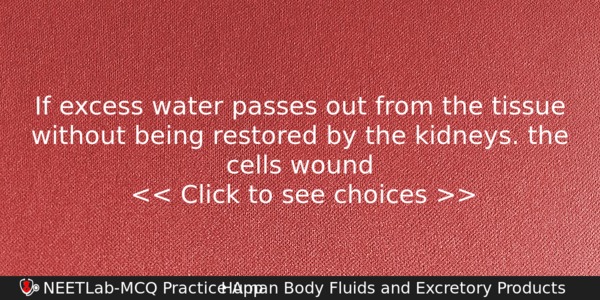| ⇦ | 
| ⇨ |
If excess water passes out from the tissue without being restored by the kidneys. the cells wound
Options
(a) Burst open and die
(b) Take water from the plasma
(c) Not be affected at all
(d) Imbibe water and then undergo plasmolysis
Correct Answer:
Not be affected at all
Explanation:
Excess water in the blood affects the osmoreceptors present in hypothalamus and volume receptors present in left atrium, ventricles and pulmonary veins. This causes ADH release so that body hydration is regulated by removal of excess water by kidney. Individual cells have no role to play in this process.
Related Questions: - Which of the following exist in maximum number in terms of genera and species?
- Endosperm may completely be consumed by the developing embryo before the seed
- Pyruvic acid is produced at the end of which of the following?
- If kept in 08 NaCI RBCs will
- Biological concept of species is mainly based on
Topics: Human Body Fluids and Excretory Products
(197)
Subject: Biology
(4253)
Important MCQs Based on Medical Entrance Examinations To Improve Your NEET Score
- Which of the following exist in maximum number in terms of genera and species?
- Endosperm may completely be consumed by the developing embryo before the seed
- Pyruvic acid is produced at the end of which of the following?
- If kept in 08 NaCI RBCs will
- Biological concept of species is mainly based on
Topics: Human Body Fluids and Excretory Products (197)
Subject: Biology (4253)
Important MCQs Based on Medical Entrance Examinations To Improve Your NEET Score
18000+ students are using NEETLab to improve their score. What about you?
Solve Previous Year MCQs, Mock Tests, Topicwise Practice Tests, Identify Weak Topics, Formula Flash cards and much more is available in NEETLab Android App to improve your NEET score.
Share this page with your friends

Leave a Reply